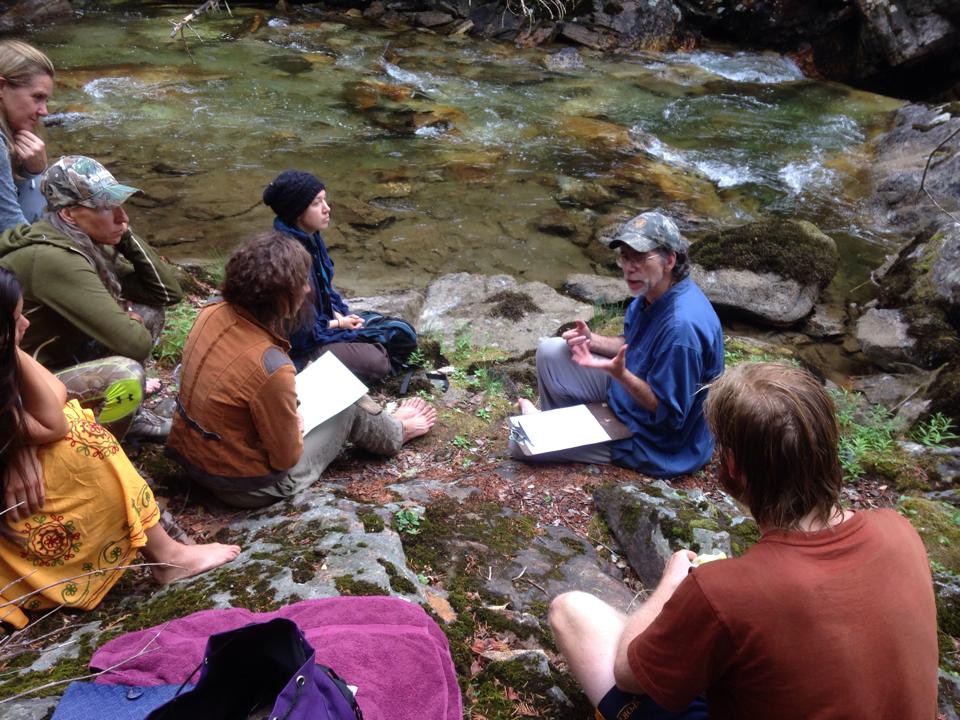newsroom
Welcome to the Wildcraft Forest School Extension Newsroom.
Wildcraft Forest School
At the Wildcraft Forest
1981 Highway 6 Lumby, British Columbia
Discovery Centre – 250.547.2001 Email: treks(at)uniserve.com
This website and all material is copyrighted by the Wildcraft Forest
The Wildcraft Forest School offers skills, insights and
inspiration for creating good stewardship and positive change.
www.WildcraftForestSchool.com
Communiqué - March 6, 2019
Grassroots regeneration efforts engage with
UN Decade on Ecosystem Restoration
Wildcraft Forest School says each of us can make a difference.
“As we seek to slow the impacts of climate change lets not forget about nature”
- Don Elzer, founder of the
Wildcraft Forest School (pictured above)
VERNON, BRITISH COLUMBIA - The Wildcraft Forest School has been on the leading edge of teaching methods by which individuals and communities can engage in restoring and regenerating ecosystems in an effort to help the Earth, and to further understand the process of stewardship and how a relationship with nature works.
The British Columbia-based organization offers camps all summer long as well as distance learning programs which have quickly expanded to 19 countries – and now its poised to receive a great deal of extra exposure with the help of an announcement from the United Nations on Friday.
The United Nations General Assembly declared 2021 – 2030 the UN Decade on Ecosystem Restoration. The UN claims that this effort will offer unparalleled opportunity for job creation, food security and addressing climate change; and that environmental restoration could remove up to 26 gigatons of greenhouse gases from the atmosphere. The effort aims to massively scale up the restoration of degraded and destroyed ecosystems as a proven measure to fight the climate crisis and enhance food security, water supply and biodiversity.
For the Wildcraft Forest School it will mean an expanded global audience for its approach to the regeneration of ecosystems.
“We believe that nature is sentient – that is, that all of it and the small pieces of it, have awareness, intelligence and intention,” said Don Elzer the founder of the Wildcraft Forest School.
The school has attracted adults from all walks of life who want to be actively involved with helping restore ecosystems. Elzer maintains that this work helps the individual restore meaning and purpose within their lives.
“There are more and more people tired of complaining on deaf ears – they want to actually do something. Saving this planet will not just be achieved with economic or political frameworks – it will also require a spiritual engagement – a belief that we must do the right thing – we must love all species and the landscape around us, more than we love ourselves”.
Elzer maintains that as the climate changes, species are on the move and it’s up to us to restore the wild habitat that will help these species as they relocate to safer areas.
“The satisfaction of making bird nesting habitat, or planting trees – whatever the action might be, must be about helping those living beings first and foremost. By investing in nature, she will invest in us – this represents the true economy of a living Earth – and this helps us grow mindfulness towards all living beings; and then towards each other.”
Elzer suggests that the UN effort is timely because the restoration of wild ecosystems will be the most important issue facing humanity in the coming years.
“The UN Decade on Ecosystem Restoration will help countries race against the impacts of climate change and biodiversity loss,” said José Graziano da Silva, Director-General of the Food and Agriculture Organization of the United Nations (FAO). “Ecosystems are being degraded at an unprecedented rate. Our global food systems and the livelihoods of many millions of people depend on all of us working together to restore healthy and sustainable ecosystems for today and the future.”
Elzer adds, “With all of our efforts to become more energy efficient and more food secure, we must not forget nature – because it provides us with the elements of our primary life support”.
The degradation of land and marine ecosystems undermines the well-being of 3.2 billion people and costs about 10 per cent of the annual global gross product in loss of species and ecosystems services. Key ecosystems that deliver numerous services essential to food and agriculture, including supply of freshwater, protection against hazards and provision of habitat for species such as fish and pollinators, are declining rapidly.
Restoration of 350 million hectares of degraded land between now and 2030 could generate $9 trillion in ecosystem services and take an additional 13-26 gigatons of greenhouse gases out of the atmosphere.
The UN effort maintains that the decade represents a global call to action as it seeks to draw together political support, scientific research and financial muscle to massively scale up restoration from successful pilot initiatives to areas of millions of hectares. Research shows that more than two billion hectares of the world’s deforested and degraded landscapes offer potential for restoration.
For the Wildcraft Forest School it means carrying out activities which will have a little more public light shining on them.
“Creating a relationship with nature needs to return back into our culture. We need to take practical hands-on responsibility as stewards of small places which together make up this planet that we call home,” said Elzer.
To learn about the Wildcraft Forest visit their Extension Services website at:
(30)
For an interview contact Don Elzer at 250.547.2001 or by email at: donelzer@uniserve.com



